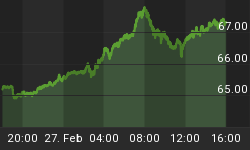Homebuilder Hovnanian drops 2006 guidance
The first of many Katrina warnings
Spectrum Brands complains about raw material inflation
Since Hurricane Katrina struck, the Dow Jones has gone from 10,397 to 10,595 -- a 198 point increase.
You know what the silly bulls are doing? They are assuming that the massive government spending on Hurricane Katrina relief is going to be just as positive for the economy as the massive tax and interest rate cuts we saw immediately after 9-11.
But let me tell, a measly $2,000 debit card for all hurricane victims will have nowhere near the impact of billions of dollars of tax cuts and Alan Greenspan rate cuts.
The economy was already slowing down before Hurricane Katrina hit and inflation had already picked up a very strong head of steam.
The Jack-and-the-beanstalk crowd is setting themselves up for some very large disappointment.
Homebuilder Hovnanian drops 2006 guidance. Who should you believe? The real-estate-can't-go-down crowd or the CEOs that actually run the companies that build houses?
If the answer is the later, you better listen to what Hovnanian, who reported Q3 earnings that were below Wall Street expectations and pulled down guidance for 2006.
For the quarter ending July 31, Hovnanian made $1.76 a share, slightly below the $1.78 Wall Street was expecting. The problem was simple: sales are slowing down.
"Although we continued to see some pricing power in many of our heavily regulated markets, the pace of sales price increases has moderated during the third quarter."
The bigger blow, however, was for a substantial revision to 2006 forecasts. Wall Street had its fingers crossed for $8.55 of profits, but Hovnanian lowered its guidance to $8.05 to $8.40 instead.
Unless you think Hovnanian is suffering from some sort of isolated problem that isn't affecting the rest of the real estate world, you should walk away with a jaded view of the real estate mania.
Prices are peaking. Sales are slowing.
And the real-estate-can't-go-down crowd has set themselves up for some very large disappointments.
The first of many Katrina warnings. Spice-maker McCormick's (NYSE:MCK)lowered its Q3 and full-year earnings forecast because of...Hurricane Katrina.
McCormick's now sees 2005 earnings of $1.58 to $1.62 a share instead of $1.66 to $1.70 a share. For Q3, it now expects to report 33to 35 cents of profit, below the 37 cents Wall Street was counting on.
What's the problem?
"Our growth in 2005 has been limited by issues including vanilla, sales to industrial customers and hurricane Katrina."
Katrina is a convenient scapegoat, but the reality is that business is simply slowing down.
"At this time our industrial business is experiencing continued volatility in demand with certain customers as well as pricing pressure due to competitive activity."
"Industrial business" is McCormick's term for restaurants, which means that the restaurant industry is slowing down.
We've talked several times about how sky-high gas prices are sucking up American's disposable income and forcing them to cut back in other areas...like eating out at restaurants.
Mark my words; you're going to hear hundreds of other companies blame Hurricane Katrina for their problems. It is sure a lot easier than admitting that business is bad because the economy is slowing down.
Spectrum Brands complains about raw material inflation. Spectrum Brands, better know by its former name of Rayovac, dropped its profit guidance because of weak demand and rising raw material prices.
First of all, this is the second profit warning in six weeks.
Secondly, Spectrum warned that its problems are simply slowing demand.
"Consumer demand appears softer this quarter across many of Spectrum Brands' product categories."
Frankly, I find it amazing that Spectrum would issue a warning about slumping demand while our country is in the midst of one of the worst natural disaster in history. Batteries should be flying off the shelves.
But they're not...and that is very telling.
Lastly, Spectrum is having a tough time dealing with the rapid rise in raw material and transportation costs.
"Secondly, raw materials cost increases have accelerated recently in oil and natural gas, negatively impacting urea, plastics and packaging materials and transportation costs."
This is exactly why you should pay zero attention to the don't-eat-don't-drive "core" inflation numbers that Wall Street and Alan Greenspan keep telling you to focus on.
Inflation is a problem.
Interest rates are headed higher.
And stocks are ultimately headed lower.















